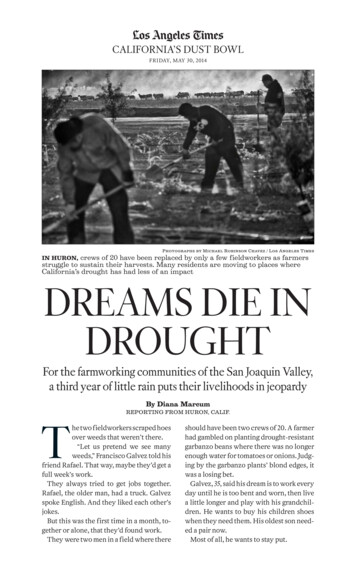
Transcription
CALIFORNIA’S DUST BOWLFRIDAY, MAY 30, 2014Photographs by Michael Robinson Chavez / Los Angeles Timescrews of 20 have been replaced by only a few fieldworkers as farmersstruggle to sustain their harvests. Many residents are moving to places whereCalifornia’s drought has had less of an impactIN HURON,DREAMS DIE INDROUGHTFor the farmworking communities of the San Joaquin Valley,a third year of little rain puts their livelihoods in jeopardyBy Diana MarcumREPORTING FROM HURON, CALIF.The two fieldworkers scraped hoesover weeds that weren’t there.“Let us pretend we see manyweeds,” Francisco Galvez told hisfriend Rafael. That way, maybe they’d get afull week’s work.They always tried to get jobs together.Rafael, the older man, had a truck. Galvezspoke English. And they liked each other’sjokes.But this was the first time in a month, together or alone, that they’d found work.They were two men in a field where thereshould have been two crews of 20. A farmerhad gambled on planting drought-resistantgarbanzo beans where there was no longerenough water for tomatoes or onions. Judging by the garbanzo plants’ blond edges, itwas a losing bet.Galvez, 35, said his dream is to work everyday until he is too bent and worn, then livea little longer and play with his grandchildren. He wants to buy his children shoeswhen they need them. His oldest son needed a pair now.Most of all, he wants to stay put.
California’s Dust Bowldrought drags into a third year, workers like Hector Ramirez arelucky to find a day or two of work a week. The recent rate was 8.50 an hour.AS CALIFORNIA’SBut the slowly unfurling disaster of California’sdrought is catching up tohim. Each day more families are leaving for Salinas,Arizona, Washington —anywhere they heard therewere jobs.Even in years when rainfalls and the Sierra mountains hold a snowpack thatwill water almonds andonions, cattle and cantaloupes, Huron’s popuFRANCISCO GALVEZ, 35, sits on the floor of hislation swells and withersmodest home as a Mormon missionary speaks withwith the season.his family. In Huron, religion has sprouted whereThese days in Huron —crops have not.and Mendota and Wascoand Firebagh and all the other farmworkerchildren school supplies. When he left forcommunities on the west side of the Santhe fields, his wife, Maya, would send him offJoaquin Valley — even the permanent popwith a lunch of tortillas and beans and fruit.ulations are packing up.It was late afternoon on this April day. He“The house across the street from us —hadn’t eaten since the night before.they all left yesterday,” Galvez said. “MayHe was more than a month behind on hisbe this town won’t be here anymore?” 850-a-month rent, but his landlord hadSince the days of the Dust Bowl, theseagreed to let him pay a little each week.have been the places where trouble hitsThe month before, when Maya told himfirst and money doesn’t last.she was pregnant, she apologized.Before the drought moved into Year“She told me she is worried for me beThree, Galvez paid the rent and bought hiscause there is no work,” he said. “But I toldDREAMS DIE IN DROUGHT FRIDAY, MAY 30, 20142
California’s Dust Bowlof hungry workers crowding in to eat at all hours of the day, theMexico Cafe in Huron has cut back its hours. Since the days of the Dust Bowl, suchfarmworker communities have been places where trouble hits first and moneydoesn’t last.WITH A DEARTHher, ‘A baby is a happy thing. Don’t worry,we’ll handle it. I will try. I will do my best.’”Galvez’s house is ranch-style, threebedrooms. There’s a prancing Chihuahuanamed Mommy and a crate of oranges inthe corner — a farmer gave Galvez permission to gather fruit on the ground.The walls are freshly painted and hungwith school class photos and a calendarwith scenes of Yosemite and scripture. Butsome windows are cracked and there’s almost no furniture.The people who broke in on the same dayGalvez learned his wife was pregnant tookeverything, even the beds. They left onewooden chair.The neighbors across the street broughtover a big-screen TV and a soft chair. Galvez borrowed money from his brother inTexas to fix the largest window. His brother, he said, is the type of person who expects to be paid back promptly.The garbanzo field yielded two days ofwork. It was now two weeks later and Galvez hadn’t found any other jobs. He saidthe fields are his only choice. In Oaxaca, heleft school after fourth grade to work. He’sbeen in California since he was 17, but he isnot a U.S. citizen.Rafael, a man who has worked undermany last names, knows a lot of contractorsand used to be able to line up work aheadof time.But now, in the early mornings, long beforesunrise, they go to the parking lot in front ofthe panaderia where they can no longer afford to buy Mexican sweetbread and coffee.They wait with other day laborers for a contractor to drive up and bark an offer.The week before the going rate was 8an hour, minus 8 to 12 a day for a ride inthe van to fields 45 minutes away. So manypeople have fled town that farmers werehurting for workers and the offer on thisday had gone up to 8.50 an hour. Still, Galvez hadn’t been hired. He went home whenhe wanted to be working.His two youngest girls, a tangle of giggles,played leapfrog in the empty living room.Manuel, 16, the oldest of six children, wasin his room studying.Galvez is proud of Manuel for avoidingthe streets.“He comes straight home from school.He works out, watches TV and stays inside.He wants to join the Navy someday,” Galvez said. “I tell the other ones, ‘Be like yourbrother.’”Shyly, lowering his head, Galvez recalledthat recently Manuel gave him a playfulDREAMS DIE IN DROUGHT FRIDAY, MAY 30, 20143
California’s Dust Bowlpunch in the arm and they tussled the way they did when hisson was small.“He told me he was proud ofme. He told me he wanted to belike me,” Galvez said. “I said, ‘Idon’t want you to be like me.You have to be better than me.’”By late April, the air held thewarmth of growing season.Water flowed in concrete canals. Precisely set sprinklerssent their spray ch-ch-ch-ingWHEN MAYA, Galvez’s wife, found out sheover fields. A high school runnerwas pregnant with their seventh child, sheapologized. “She told me she is worried for mein red shorts stood out againstbecause there is no work.”miles of blue-green onion fields.The illusion of lushness wasthere. But without the rains,even California’s vast systemof buying, selling, pumpingand moving trillions of gallonsof water from the SacramentoDelta to this dry, clay-bottomplain — even pumping so muchgroundwater that parts of theCentral Valley sink a foot a year— wasn’t enough to keep Huron working.The main drag was as sleepyFARMWORKERS who once could line up workas the stray dogs napping in evahead of time now gather at a local panaderia towait for a contractor to drive up and bark an offer.ery shady doorway. Two menin cowboy hats gossiped on abench. A daily afternoon poker game was“It’s going to get worse,” he said. “They’relanguidly being played in a window boothnot planting. Think what it will be like atat a near-empty cafe.harvest.”“Only for fun, no money,” the waitressChavarrias came from El Salvador, where,said, though there were clearly stacks ofhe said, people make 6 for five hours ofbills on the table.work. He supports a 22-year-old daughterHuron already whispered of the ghost townand a 20-year-old son going to college there.it could soon be: It has a 2-million deficit.“They’re in my heart,” he said. He hasn’tOnly about 1,000 people in a town withseen them in 10 years.a permanent population of 7,000 are regisGalvez is determined that the one sacrificetered to vote, and of those, only some 200he won’t make for his family is leaving them.actually do.Once before when times were hard, heNo one has declared for the two openwent alone to Texas to work. He was goneCity Council seats — including the incummore than three years.bents. Each week at school, Galvez’s chilThere was another man. He almost lostdren have fewer classmates.his wife.Antonio Chavarrias, a fieldworker, said“I lose time with the children. I lose everythe drought is different from other naturalthing,” he said. “I don’t want to do it again.”disasters because it doesn’t end.But if they stay, he doesn’t have work.This is the third year of drought but, heThe family now owed almost two months’said, just the beginning of the hardships.back rent.DREAMS DIE IN DROUGHT FRIDAY, MAY 30, 20144
California’s Dust Bowl“It’s breaking my head, wondering what are we going to do, whatare we going to do?” he said.Mormons were at Galvez’s house— two blond, Spanish-speakingwomen from Utah who had beencoming weekly.Down the street, a man in a crispplaid shirt was walking around inthe heat, shaking hands and introducing himself to everyone he“WE’VE BEEN having less problems downtown,”passed. He was an evangelical pasHuron’s police chief says of an area once knowntor from Lemoore.for violence and prostitution. “People have lessThe drought is bringing a lot ofmoney in their pocket. They’re saving it tomove.”religion to Huron. Ministers walkthe streets; bars notorious for violence and prostitution are empty.“We’ve been having less problems downtown,” said PoliceChief George Turegano, a retired Capitola officer. “Peoplehave less money in their pocket.They’re saving it to move to thenext town, the next job.”When Turegano took the jobtwo years ago — the 10th policechief in about as many years — hetold his friends in law enforceDROUGHT IS different from other naturaldisasters because it doesn’t end, one fieldworkerment that Huron was like thesays. Though rain has been scarce for years,Wild West.some workers believe this is just the start of“Not too many bedroom comtheir hardships.munities have the level of nightlyshootings, prostitution and domestic abuseand picking, Galvez had found three daysas these small Westside towns,” he said. “Butof work in two weeks.it’s calmer lately.”The family was down to the amount ofAt Galvez’s house the lead missionaryhis last check: 256. They had stocked upwas encouraging Galvez’s middle daughter,on huge bags of beans and rice. The Mor12-year-old Dianey, in prayer.mon missionaries had brought misshapen“Just say what’s in your heart,” she told her.cupcakes, the cake not reaching to the topDianey haltingly gave thanks for wakof the cups and canned chocolate frostinging up in the morning, and that her grandthree times higher. Two family friends hadmother hadn’t been sick lately. She didn’tbrought over bags of sweet breads and cipray for rain as numerous signs across thelantro from their garden.Central Valley suggest.Galvez and Maya called a family meetGalvez, who was raised Catholic, has beening. Galvez said they told the children theygoing to several different churches.would probably be moving to Texas soon.“I like what they say. They all say the sameThe 15-year-old, Itzel, said no, she hadthing: ‘If your mind is right you can talk toa boyfriend. The 11-year-old, Francisco,God and he will tell you what to do,’” he said.said no, he liked his school. The oldest son,“I still have to learn how to make my mindManuel, said not a word. He only put aright.”hand on his father’s shoulder.In May, a season when Huron’s population once doubled with workers plantingdiana.marcum@latimes.comDREAMS DIE IN DROUGHT FRIDAY, MAY 30, 20145
played leapfrog in the empty living room. Manuel, 16, the oldest of six children, was in his room studying. Galvez is proud of Manuel for avoiding the streets. "He comes straight home from school. He works out, watches TV and stays inside. He wants to join the Navy someday," Gal-vez said. "I tell the other ones, 'Be like your brother.'"










